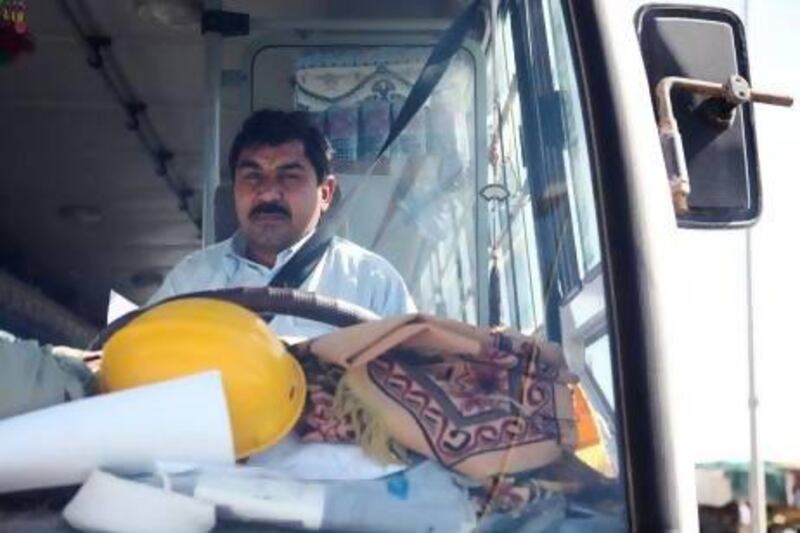DUBAI // The collision between the bus and lorry that killed 24 people shows there is not enough being done to ensure heavy vehicles are safe to drive, experts say.
Mandatory annual checks and ad-hoc roadside inspections on heavy-goods lorries are not enough to ensure they are roadworthy.
"Lorries are not involved in many accidents, but when crashes occur they involve fatalities and injuries," said Dr Abdulilah Zineddin, who specialises in traffic engineering and safety in Abu Dhabi.
"There is not enough done to ensure buses and lorries are roadworthy and safe.
"Safety could be improved. We still have a long way to go."
Monday's accident in Al Ain happened after the brakes failed on a lorry that was loaded with 75 tonnes of sand and building materials.
It slammed into the back of a bus carrying 45 maintenance workers from Al Hakeem Decoration.
According to witnesses, the two vehicles were also too close.
Col Hamad Nasser Al Baloushi, director of traffic for Abu Dhabi external regions (Al Ain, Mussaffah and the Western Region), said investigations were continuing.
"There were witnesses," Col Al Baloushi said. "Some passengers are still alive, including the bus driver. All of those will be questioned too."
The case has been referred to prosecutors.
Col Al Baloushi could not comment on possible charges the lorry driver could face.
"We are doing our investigations to find out the truth," he said.
Ahmad Bahrozyan, chief executive of the Roads and Transport Authority's (RTA) licensing agency, said the age and condition of a lorry needed to be considered before it could be driven safely.
"Heavy vehicles are driven for hundreds of miles and under very stressful conditions in our hot climate," Mr Bahrozyan said.
"Just relying on annual inspections, as we do with light vehicles, is not enough to ensure safety."
Lorries and trucks are subject to annual inspections by the RTA that look at parts including brakes, suspension, wheels and tyres, right down to the condition of the steering wheel.
The authority also carries out random roadside checks on heavy vehicles, which focus on brakes, tyres and overloading.
But Mr Bahrozyan said the overall responsibility for ensuring lorries are in good working order falls on the companies and operators.
"Operators must look at safety as part of the big picture and address it," he said. "Unfortunately, too many out there are cutting corners and trying to save money in exchange for public safety.
"We've had cases where tyres are changed just for the duration of the inspection and then the old tyres are refitted. These reckless practices are very difficult to catch.
"However, there are also operators who go above and beyond the requirements. Some choose to send their drivers for additional training after they've already received their licence.
"But these are a small fraction. The majority lack a sense of responsibility towards public safety."
Maj Gen Mohammed Saif Al Zaffin, head of the Dubai Police traffic department, said officers routinely checked lorries to make sure their loads were properly secured, they had working lights and were in good road condition.
Last year more than 15,000 lorries were stopped and inspected.
In a bid to boost safety standards nationwide, the RTA has created a vehicle detection clearance system, which is awaiting federal approval.
"Fines are no longer enough to ensure that any detected defects are repaired in time," Mr Bahrozyan said.
"With this system we will be able to set a deadline, depending on the severity of the defects, and follow up with the operator to ensure that repairs are made promptly.
"Seeing as we get heavy vehicles coming through Dubai from all over the country, it is not enough just to implement this system in Dubai. It had to be addressed federally.
"The system is one of our biggest steps towards road safety and we should be getting federal approval very soon."
Companies are also required to register the trailers used to haul goods with the RTA. The department plans to have all commercial trailers registered by April.
"It's not enough just having the vehicles pass inspection when the trailers they are hauling can be more than twice the size and can end up just as worn down from the road as the vehicles," said Mr Bahrozyan. "Our main concern was the safety standards of the locally built trailers. We knew that the internationally built trailers are constructed to a strict set of standards but there are no standards set for local manufacturers."
He said the RTA had been working with Dubai Municipality to contact registered companies that used trailers and assist them in the registration process.
[ rruiz@thenational.ae ]






